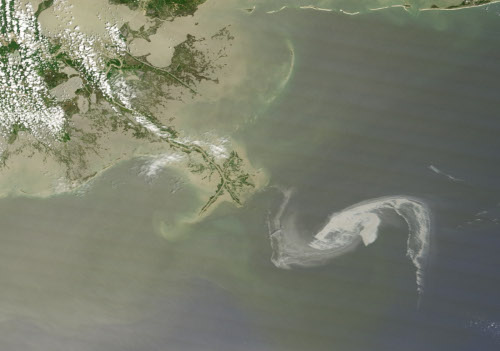
Satellite image of the Gulf of Mexico oil slick, April 29. Source: NASA Earth Observatory.
![]() The causes of the explosion on the Deepwater Horizon rig that has led to 5000 barrels (210,000 gallons) of oil a day being leaked into the Gulf of Mexico, and an oil slick that can be seen from space, are still murky (Update: but check out a detailed account of the accident, courtesy of mandobob in the comments below). What we do know so far does not reflect particularly well on BP, who apparently understated the magnitude of the leak following the accident. Worse, just today the New York Times has reported claims that they exceeded the remit of their licence by drilling too deeply, and decided against installing a cut-off valve in the well, (in addition to choosing not to install another safety device that could also have shut off the well) although in the latter case I find the fact that BP had a choice in the matter just as disturbing as the fact that they chose incorrectly.
The causes of the explosion on the Deepwater Horizon rig that has led to 5000 barrels (210,000 gallons) of oil a day being leaked into the Gulf of Mexico, and an oil slick that can be seen from space, are still murky (Update: but check out a detailed account of the accident, courtesy of mandobob in the comments below). What we do know so far does not reflect particularly well on BP, who apparently understated the magnitude of the leak following the accident. Worse, just today the New York Times has reported claims that they exceeded the remit of their licence by drilling too deeply, and decided against installing a cut-off valve in the well, (in addition to choosing not to install another safety device that could also have shut off the well) although in the latter case I find the fact that BP had a choice in the matter just as disturbing as the fact that they chose incorrectly.
But there is a wider point to be considered here. The offshore drilling industry is currently undergoing a transition. Most easy targets have already been developed, and yet global demand for oil is not abating. In an attempt to quench this thirst, attention is moving into more technically challenging areas, with more complex geology and often in the deeper waters of the outer continental shelf continental slope. The increasing complexity of the equipment required to drill in such areas increases the number of things that can go wrong, and the location of the drilling makes dealing with catastrophic failures much more difficult, as we are seeing all too clearly this week.
Even if you set aside the climatic impacts of using oil to fuel our civilisation, there are environmental risks associated with drilling for it and transporting it. But I’m not sure that many people fully appreciate that for the newer oil fields that are being developed, and proposed for development, these risks are potentially much higher. The fact that current industry practices have, on the whole, not led to major spills in the past couple of decades* is no guarantee that they reduce the risks to acceptable levels at these new, more extreme drilling locations. This is especially true when, in the absence of rigorous regulatory scrutiny, oil companies are tempted to take shortcuts that may not have led to disaster in the past, but could be catastrophic where the margins of safety are lower.
In that context, I have been struck by several parallels between events in the Gulf of Mexico and Lusi , the mud volcano in Indonesia that is widely believed to have been triggered by exploratory drilling. In both cases, drilling was taking place in a difficult drilling environment with low margins of error (in the case of Lusi, the suspect hole was drilled in an area ‘primed’ for mud volcano formation). In both cases, the drilling companies did not follow absolute best practice (in the case of Lusi, they failed to case the well, which would probably have prevented the blow-out). In both cases the environmental and economic consequences for the surrounding area are severe and of long duration.
At the moment, the focus is rightly on trying to seal the Deepwater Horizon well leak and reducing as much as possible the environmental damage in the Gulf of Mexico. But one fact cannot, and should not, be ignored: the demand for oil is not going away any time soon. That demand is driving drilling in places where accidents of this sort – major, hard to stem leaks – are going to be a major risk, and our safety regulations should be evolving to adjust to this new reality. As a start, I’d propose that emergency shut-off valves cease to be an optional extra on drilling rigs.
*this ignores, of course, what has been recently pointed out by Lab Lemming, and Lisa Margonelli in the New York Times: that major spills have been regularly occurring – and largely ignored by the developed world – in places like Nigeria. The fact that oil companies have such a poor record in places unlikely to be touched by Western media and public outrage does not instil much confidence in the idea of self-regulation.



Comments (20)